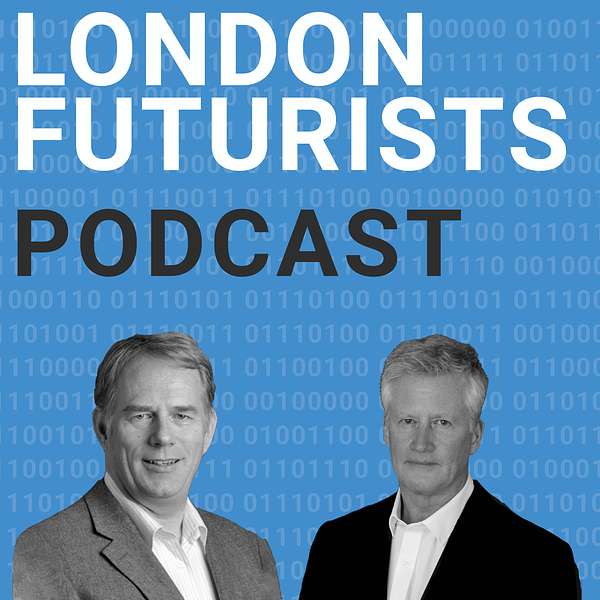
London Futurists
Anticipating and managing exponential impact - hosts David Wood and Calum Chace
Calum Chace is a sought-after keynote speaker and best-selling writer on artificial intelligence. He focuses on the medium- and long-term impact of AI on all of us, our societies and our economies. He advises companies and governments on AI policy.
His non-fiction books on AI are Surviving AI, about superintelligence, and The Economic Singularity, about the future of jobs. Both are now in their third editions.
He also wrote Pandora's Brain and Pandora’s Oracle, a pair of techno-thrillers about the first superintelligence. He is a regular contributor to magazines, newspapers, and radio.
In the last decade, Calum has given over 150 talks in 20 countries on six continents. Videos of his talks, and lots of other materials are available at https://calumchace.com/.
He is co-founder of a think tank focused on the future of jobs, called the Economic Singularity Foundation. The Foundation has published Stories from 2045, a collection of short stories written by its members.
Before becoming a full-time writer and speaker, Calum had a 30-year career in journalism and in business, as a marketer, a strategy consultant and a CEO. He studied philosophy, politics, and economics at Oxford University, which confirmed his suspicion that science fiction is actually philosophy in fancy dress.
David Wood is Chair of London Futurists, and is the author or lead editor of twelve books about the future, including The Singularity Principles, Vital Foresight, The Abolition of Aging, Smartphones and Beyond, and Sustainable Superabundance.
He is also principal of the independent futurist consultancy and publisher Delta Wisdom, executive director of the Longevity Escape Velocity (LEV) Foundation, Foresight Advisor at SingularityNET, and a board director at the IEET (Institute for Ethics and Emerging Technologies). He regularly gives keynote talks around the world on how to prepare for radical disruption. See https://deltawisdom.com/.
As a pioneer of the mobile computing and smartphone industry, he co-founded Symbian in 1998. By 2012, software written by his teams had been included as the operating system on 500 million smartphones.
From 2010 to 2013, he was Technology Planning Lead (CTO) of Accenture Mobility, where he also co-led Accenture’s Mobility Health business initiative.
Has an MA in Mathematics from Cambridge, where he also undertook doctoral research in the Philosophy of Science, and a DSc from the University of Westminster.
London Futurists
Inventing the future of computing, with Alessandro Curioni
OpenAI's ChatGPT and picture generating AI systems like MidJourney and Stable Diffusion have got a lot more people interested in advanced AI and talking about it. Which is a good thing. It will not be pretty if the transformative changes that will happen in the next two or three decades take most of us by surprise.
A company that has been pioneering advanced AI for longer than most is IBM, and we are very fortunate to have with us in this episode one of IBM’s most senior executives.
Alessandro Curioni has been with the company for 25 years. He is an IBM Fellow, Director of IBM Research, and Vice President for Europe and Africa.
Topics discussed in this conversation include:
*) Some background: 70 years of inventing the future of computing
*) The role of grand challenges to test and advance the world of AI
*) Two major changes in AI: from rules-based to trained, and from training using annotated data to self-supervised training using non-annotated data
*) Factors which have allowed self-supervised training to build large useful models, as opposed to an unstable cascade of mistaken assumptions
*) Foundation models that extend beyond text to other types of structured data, including software code, the reactions of organic chemistry, and data streams generated from industrial processes
*) Moving from relatively shallow general foundation models to models that can hold deep knowledge about particular subjects
*) Identification and removal of bias in foundation models
*) Two methods to create models tailored to the needs of particular enterprises
*) The modification by RLHF (Reinforcement Learning from Human Feedback) of models created by self-supervised learning
*) Examples of new business opportunities enabled by foundation models
*) Three "neuromorphic" methods to significantly improve the energy efficiency of AI systems: chips with varying precision, memory and computation co-located, and spiking neural networks
*) The vulnerability of existing confidential data to being decrypted in the relatively near future
*) The development and adoption of quantum-safe encryption algorithms
*) What a recent "quantum apocalypse" paper highlights as potential future developments
*) Changing forecasts of the capabilities of quantum computing
*) IBM's attitude toward Artificial General Intelligence and the Turing Test
*) IBM's overall goals with AI, and the selection of future "IBM Grand Challenges" in support of these goals
*) Augmenting the capabilities of scientists to accelerate breakthrough scientific discoveries.
Music: Spike Protein, by Koi Discovery, available under CC0 1.0 Public Domain Declaration
Selected follow-up reading:
https://researcher.ibm.com/researcher/view.php?person=zurich-cur
https://www.zurich.ibm.com/st/neuromorphic/
https://www.nist.gov/news-events/news/2022/07/nist-announces-first-four-quantum-resistant-cryptographic-algorithms
Elevate how you lead with insight from today’s most influential executives.
Listen on: Apple Podcasts Spotify

